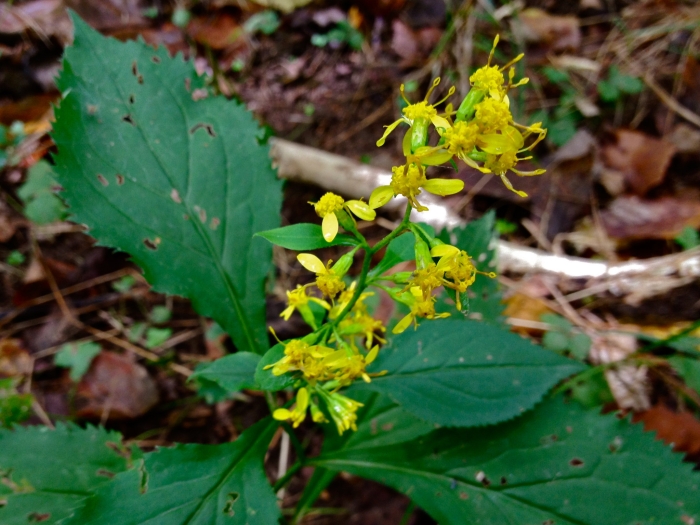Zigzag Goldenrod
(Solidago flexicaulis)
Zigzag Goldenrod (Solidago flexicaulis)
/
/

Fritz Flohr Reynolds
CC BY-SA 2.0
Image By:
Fritz Flohr Reynolds
Recorded By:
Copyright:
CC BY-SA 2.0
Copyright Notice:
Photo by: Fritz Flohr Reynolds | License Type: CC BY-SA 2.0 | License URL: https://creativecommons.org/licenses/by/2.0/ | Uploader: FritzFlohrReynolds | Publisher: Flickr |


















































Estimated Native Range
Summary
Solidago flexicaulis, commonly known as Zigzag Goldenrod, is a deciduous perennial herb native to rich, moist, deciduous forests and forest edges in the Eastern United States. It is particularly adapted to the dappled sunlight of woodland understories. The plant earns its common name from its characteristic stem, which zigs and zags back and forth, changing direction at each node where the leaves attach. Zigzag Goldenrod typically grows to a height of 1.5 to 3 feet (0.5 to 1 meter) and spreads 1 to 2 feet (0.3 to 0.6 meters) wide. It features broad, almost round leaves with elongated tips and large teeth along the edges. From late summer to early fall, it produces clusters of small, bright yellow flower heads, with some located at the stem’s end and others nestled in the leaf axils, which can number up to 250 heads per plant.
Zigzag Goldenrod is valued for its shade tolerance and the bright splash of color it adds to woodland gardens and naturalized areas with its showy yellow flowers. It is often used in border plantings, native plant gardens, and as a ground cover. This species is relatively low-maintenance, requiring medium amounts of water and thriving in soils with medium drainage. It prefers part shade but can tolerate full sun in cooler climates. While generally pest-free, it can occasionally suffer from rust and mildew. Zigzag Goldenrod is also beneficial to pollinators, attracting bees and butterflies to the garden.CC BY-SA 4.0
Zigzag Goldenrod is valued for its shade tolerance and the bright splash of color it adds to woodland gardens and naturalized areas with its showy yellow flowers. It is often used in border plantings, native plant gardens, and as a ground cover. This species is relatively low-maintenance, requiring medium amounts of water and thriving in soils with medium drainage. It prefers part shade but can tolerate full sun in cooler climates. While generally pest-free, it can occasionally suffer from rust and mildew. Zigzag Goldenrod is also beneficial to pollinators, attracting bees and butterflies to the garden.CC BY-SA 4.0
Plant Description
- Plant Type: Herb
- Height: 2-3 feet
- Width: 1-3 feet
- Growth Rate: Moderate
- Flower Color: Yellow
- Flowering Season: Summer
- Leaf Retention: Deciduous
Growth Requirements
- Sun: Full Sun, Part Shade
- Water: Medium
- Drainage: Medium
Common Uses
Bee Garden, Bird Garden, Butterfly Garden, Deer Resistant, Drought Tolerant, Fire Resistant, Hummingbird Garden, Low Maintenance, Rabbit Resistant, Showy Flowers, Street Planting
Natural Habitat
Rich, moist, deciduous forests and forest edges in the Eastern United States
Other Names
Common Names: Zig-Zag Goldenrod, Broadleaf Goldenrod, Broadleaved Goldenrod, Bredbladigt Gullris
Scientific Names: , Solidago flexicaulis, Solidago latifolia, Solidago flexicaulis var. ciliata, Solidago flexicaulis var. latifolia, Aster latifolius, Doria flexicaulis, Solidago flexicaulis f. flexicaulis, Solidago flexicaulis f. subincisa, Solidago flexicaulis var. flexicaulis
GBIF Accepted Name: Solidago flexicaulis L.